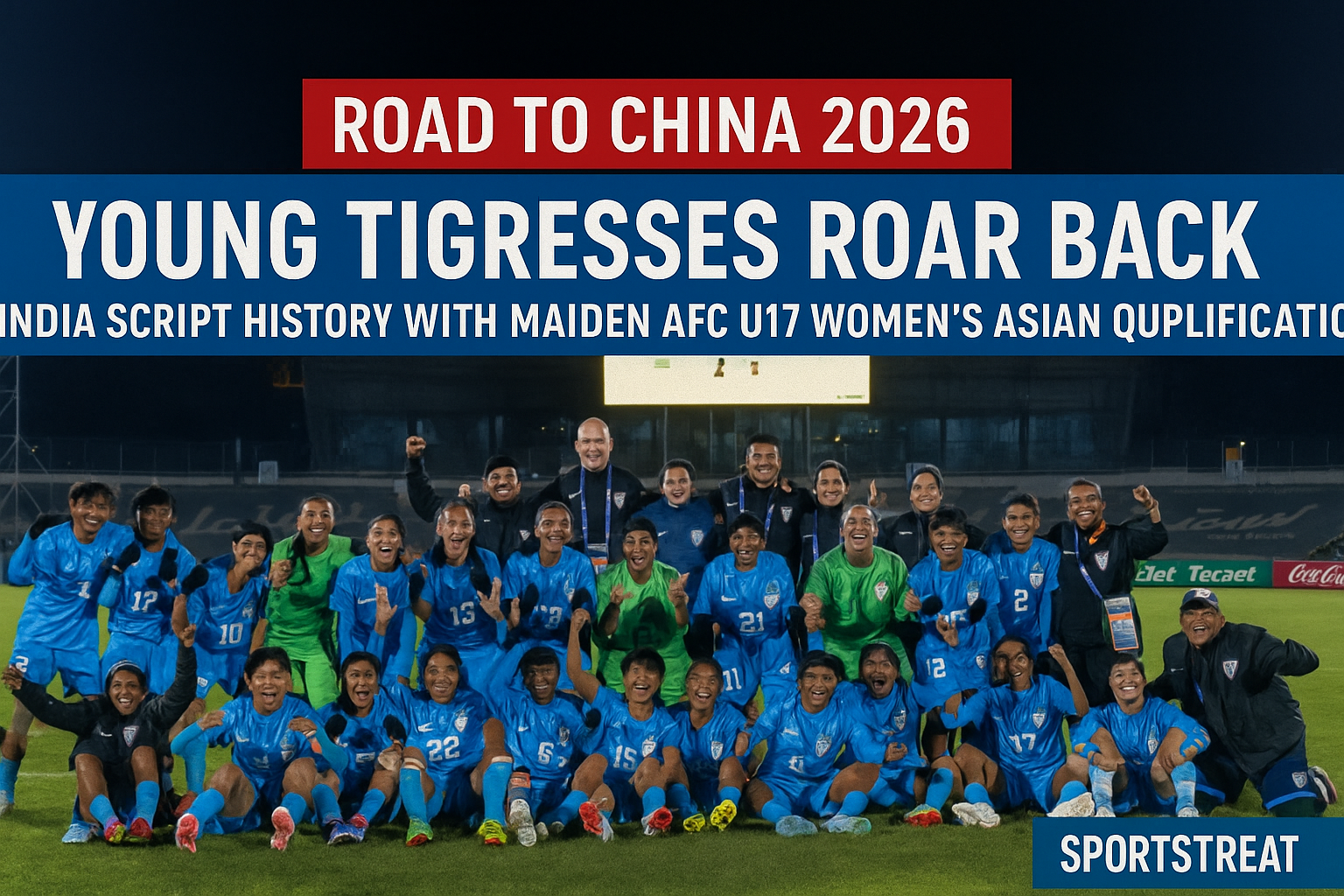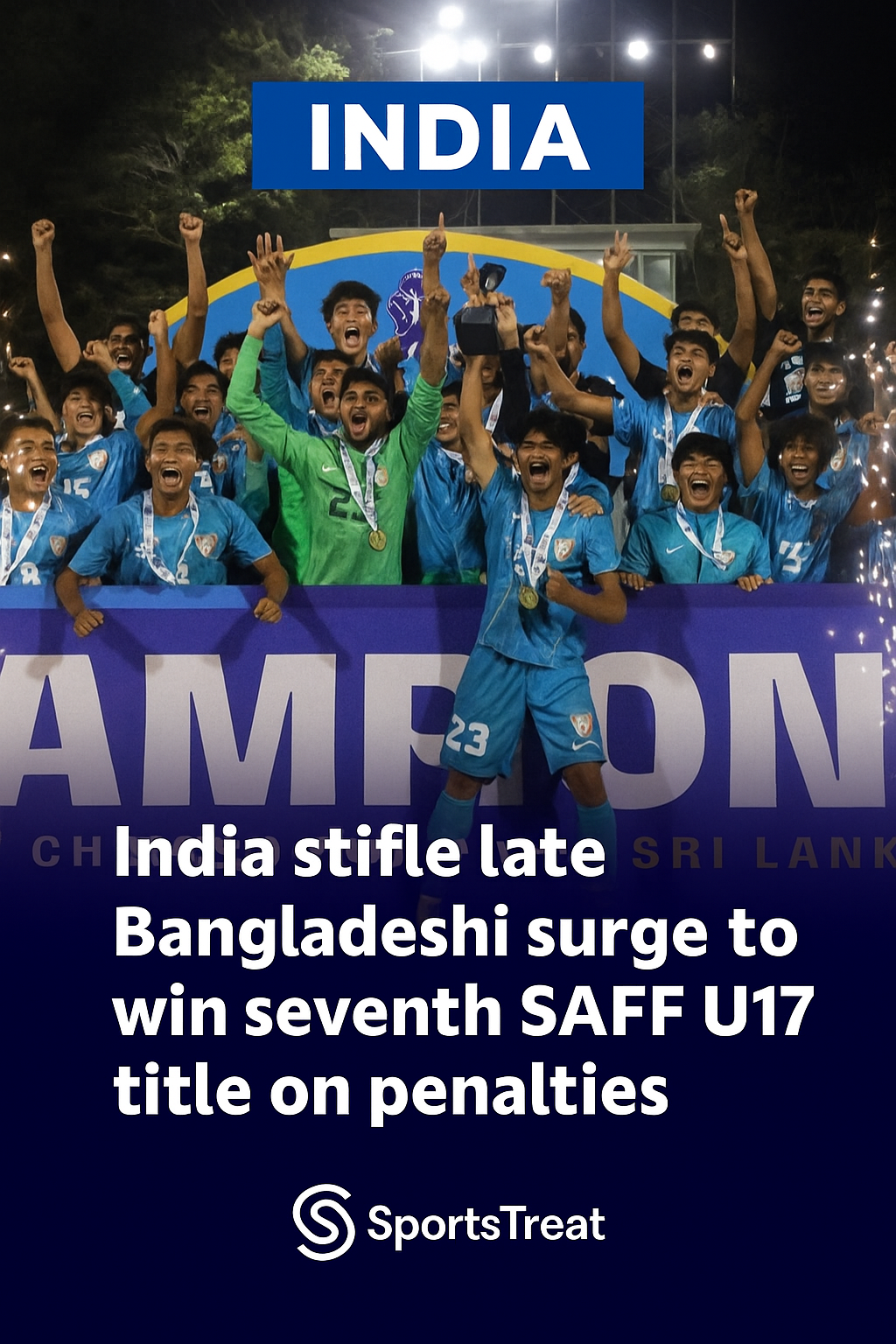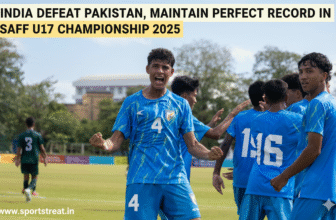
By SportsTreat News Desk | October 18, 2025
In a night that will forever be etched in Indian football history, the Young Tigresses — India’s U17 women’s football team — delivered a performance full of resilience, courage, and tactical brilliance to seal their first-ever qualification for the AFC U17 Women’s Asian Cup.
Down 0–1 at half-time against Uzbekistan in Bishkek, the Indian girls staged a dramatic turnaround to win 2–1, topping Group G and punching their ticket to the continental finals in China 2026.
🐯 The Comeback That Made History
For much of the first half, India looked nervous. Uzbekistan pressed high, controlled the midfield, and were rewarded in the 38th minute when Shakhzoda Alikhonova’s long-range strike rattled the underside of the bar and found the net.
It could have easily broken India’s spirit — but instead, it sparked a transformation. Head coach Joakim Alexandersson, sensing a lack of width and energy, made a bold move in the 40th minute, bringing on Thandamoni Baskey for Bonifilia Shullai. That decision turned the game on its head.
Barely ten minutes into the second half, Baskey made her mark. Latching onto a through ball from the right, she drilled a precise finish at the near post to equalise in the 55th minute.
Then came the moment of magic. In the 66th minute, Baskey turned creator — bursting down the left flank and cutting the ball back to Anushka Kumari, who curled it beautifully past the goalkeeper to give India a 2–1 lead.
From there, the Young Tigresses showed maturity beyond their years, keeping possession, closing gaps, and defending resolutely until the final whistle. When the referee blew for full time, history was made — and tears flowed freely.
🏆 A First for the Record Books
This triumph marks the first time India have qualified for the AFC U17 Women’s Asian Cup through the qualifiers. The only previous appearance came back in 2005 — via direct entry. This time, the girls earned it the hard way: through grit, sweat, and belief.
India’s qualification campaign had already hinted at something special. Wins over the Kyrgyz Republic and strong performances throughout Group G showed a team that was learning quickly and growing in confidence. But to finish the job with a comeback win over a physical and well-organised Uzbekistan side underlined just how far this group has come.
“This victory belongs to every player who refused to give up,” said coach Joakim Alexandersson after the match. “We talked about character, about believing in ourselves even when behind — and today the girls proved it.”
🌟 Key Players Who Shined
Thandamoni Baskey (Super Sub)
The 16-year-old forward was the hero of the night. Her goal and assist transformed the match — a performance that showcased pace, precision, and confidence.
Anushka Kumari (The Finisher)
A calm presence under pressure, Anushka’s curling winner was the stuff of dreams. She has now scored in back-to-back games and is fast becoming the team’s creative heartbeat.
Anvi Mishra & Sumitra Kujur (Defensive Wall)
Both defenders displayed composure and awareness to handle Uzbekistan’s late onslaught. Their clearances and positioning ensured India held on to the lead.
Joakim Alexandersson (The Tactician)
The Swedish coach’s proactive substitution was the turning point. His faith in young talent and emphasis on ball control have reshaped India’s approach to youth football.
⚙️ Tactical Transformation
India’s play in the second half was unrecognisable from the first. The switch to a more fluid 4-2-3-1 system after Baskey’s introduction opened up the wings and stretched the Uzbek defence. Midfielder Priya Rawat began dictating tempo from deep, while Aarti Kishore pushed higher to link midfield and attack.
The pressing improved, the passing became crisper, and India began to exploit spaces behind the Uzbek full-backs. The resilience in defence during the closing stages also reflected better game management — something often missing in previous age-group campaigns.
🚀 The Road to China 2026
Qualification means India will now rub shoulders with Asia’s elite — including Japan, North Korea, South Korea, and Australia — in the AFC U17 Women’s Asian Cup 2026, to be held in China next year.
The journey ahead won’t be easy, but this achievement changes everything. It boosts India’s FIFA youth ranking potential, attracts more attention to women’s grassroots football, and opens doors for future exposure tours and investments.
According to the All India Football Federation (AIFF), the next focus will be on enhancing physical conditioning and international experience. “This team has shown hunger,” said an AIFF official. “We will now ensure they get the right training environment to compete at the top level.”
🌍 Why This Win Matters for Indian Football
Beyond the scoreboard, this qualification sends a powerful message about the direction of Indian women’s football. Over the past five years, the AIFF has invested heavily in youth scouting, regional academies, and coaching education. The results are now visible.
It also highlights the rise of footballing opportunities for girls across smaller states — with players from Jharkhand, Manipur, Odisha, and the Northeast forming the core of this squad.
As women’s football continues to gain visibility, this success story can inspire thousands of young girls across India to dream bigger, play harder, and believe that they too can represent the nation.
🗣️ Voices from the Field
Thandamoni Baskey, match-winner: “When coach called my name, I just wanted to help the team. Scoring and assisting in such a match — I can’t describe the feeling.”
Joakim Alexandersson, head coach: “We are building something long-term. These girls have shown that India can fight and win even under pressure.”
AIFF President Kalyan Chaubey: “Our young girls have shown tremendous character. This qualification is a reward for years of effort in youth football development.”
💬 The Final Whistle
From Bhiwani to Bishkek, the Young Tigresses have taken a leap forward for Indian football. What started as a distant dream has turned into a statement of intent — that India’s women are ready to roar on the biggest Asian stage.
As the celebrations die down and preparations for China 2026 begin, one truth stands tall: the future of Indian women’s football looks brighter than ever.







Deference to website author, some wonderful information .